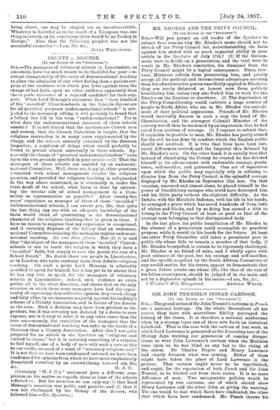COUNTY v. DIOCESE.
[TO THE EDITOR OP THE " SPECTATOR:1
Sin,—The managers of voluntary schools in Lincolnshire, as elsewhere, have too much reason to be thankful for your con- sistent championship of the cause of denominational teaching to allow the admission of any other feeling than a patient sur- prise at the readiness with which you level against them the charge of bad faith, upon no other evidence apparently than the ex parte utterance of a rejected candidate for their sup- port. When Lord Heneage's statement that "three hundred of the ' so-called' Church-schools in the Lincoln diocese are for all practical purposes undenominational schools" is sub- jected to the necessary sifting it will probably be found that & fallacy lies hid in the term "undenominational." For in what does the undenominational character of these schools consist? It is not denied that the teachers are Church men and women, that the Church Catechism is taught, that the religious instruction is in many cases supplemented by the clergy, and the schools annually examined by the diocesan inspector; a condition of things which would probably be found to prevail almost universally in these schools. Ap- parently the charge of "practical undenominationalism " rests upon the two grounds specified in your article :—(1) That the managers of these schools are assisted by an undenomi- national Committee. Well, there are, happily, other questions connected with school management besides the religious question, and provided the religious teaching is safeguarded in the way above mentioned, as it commonly is, under the trust deeds of the school, what harm is done by entrust- ing the secular side of school management to a Com- mittee as representative as possible P After twenty-five years' experience as manager of three of these " so-called " undenominational schools, I can assure you, Sir, that quite the last thing any one with an adequate knowledge of the facts would think of questioning is the denominational character of the religious teaching that is given in them. I have no reason to suppose that my experience is exceptional, and it certainly disposes of the fallacy that an undenomi- national Committee assisting the managers implies undenomi- national teaching. Ex uno disce plures. But (2) it is said that "the object of the managers of these 'so-called' Church. schools is not to teach the religion in which they have a ' so-called ' faith, but simply to save the parish the cost of a School Board." No doubt there are people in Lincolnshire, as in London, who value economy more than definite religions teaching. On such a point Lord Heneage is admirably qualified to speak for himself, but it has yet to be shown that he has any title to speak for the managers of voluntary schools in Lincolnshire ; indeed, such evidence as exists points all in the other direction, and shows that on the only occasion on which these same managers have had the oppor- tunity of expressing their collective opinion they voted, clergy and laity alike, by an enormous majority, against his lordship's scheme of a County Association, and in favour of the diocese as the area. Such a decision may have been prudent or im- prudent, but it was certainly not dictated by a desire to save expense, nor is it easy to refer it to any other cause than the true one—namely, the conviction of the managers that the cause of denominational teaching was safer in the hands of a Diocesan than a Comity Association. After this I was quite prepared for an article in the Spectator on "religious zeal carried to excess," but it is certainly something of a surprise to find myself, one of a body of men with such a vote as this to our credit, accused of a want of "necessary religious zeal." It is not that we have been condemned unheard, we have been condemned for opinions from which we have most emphatically dissociated ourselves by an overwhelming vote.—I am, Sir, H. J. C.
[Certainly "H. J. C.'s " statement puts a different com- plexion on the matter as regards three at least of the schools referred to. But for ourselves we can only say (1) that Lord Heneage's assertion was public and positive, and (2) that it was not challenged by the Bishop of the diocese, who followed him.—ED. Spectator.]


































 Previous page
Previous page